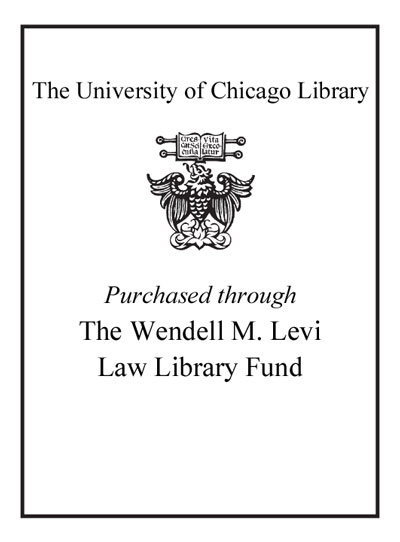Taking ethno-cultural diversity seriously in constitutional design : a theory of minority rights for addressing Africa's multiethnic challenge /
Saved in:
| Author / Creator: | Dersso, Solomon A. |
|---|---|
| Imprint: | Leiden ; Boston : Martinus Nijhoff Publishers, 2012. |
| Description: | xii, 267 p. ; 24 cm. |
| Language: | English |
| Series: | Studies in international minority and group rights, 2210-2132 ; 4 Studies in international minority and group rights ; 4. |
| Subject: | |
| Format: | Print Book |
| URL for this record: | http://pi.lib.uchicago.edu/1001/cat/bib/9119767 |
Table of Contents:
- Acknowledgement
- Chapter I. Introduction
- 1.1. Background and Objectives of the Study
- 1.2. The Concept of Minorities
- 1.3. The Framework of Minority Rights Defended in this Study
- 1.4. The Implications of a Minority Rights Framework for Democratisation in Africa
- 1.5. Methodology of the Study
- 1.6. Outline of Chapters
- Chapter II. The Issue of Minorities in Africa: Describing its Context and Understanding its Nature
- 2.1. Introduction
- 2.2. The Nature and Genesis of Ethno-Cultural Diversity in Africa
- 2.2.1. The Pre-colonial Background
- 2.2.2. Colonialism: The Emergence of New Patterns of Relations
- 2.2.3. Patterns of Ethno-Cultural Diversity Bequeathed to the Post-colonial State
- 2.2.3.1. States with a Majority Group
- 2.2.3.2. States of Minorities
- 2.3. Various Categories of Minorities and the Nature of their Claims
- 2.3.1. Ethno-Cultural Minorities
- 2.3.2. Ethno-Political Minorities
- 2.3.3. Ethno-National Minorities
- 2.3.4. Peripheral Minorities
- 2.4. Conclusion
- Chapter III. The Issue of Minorities in the Political and Constitutional Discourse and Practice of Post-colonial Africa
- 3.1. Introduction
- 3.2. The Imperative of Nation-Building
- 3.2.1. The Flaws and Ultimate Failure of Post-colonial Nation-Building in Africa
- 3.3. The Influence of the Dominant Constitutional Paradigm of the Nation-State
- 3.3.1. National (Popular) Sovereignty
- 3.3.2. The Limits of the Unitarist Conception of National Sovereignty
- 3.3.3. The Individual-Rights-Based Conception of the State-Society Relationship
- 3.4. The 'Second African Independence' and the Neglect of the Issue of Minorities
- 3.4.1. The Nature of Post-1990 Constitutional Reform
- 3.4.2. The Nature of Post-1990 Constitutional Changes and Democracy in Africa and their Limitations
- 3.5. Conclusion
- Chapter IV. The Normative Bases for Constitutional Accommodation of Ethno-Cultural Diversity in Africa: The Three Components of the Minority Rights Framework
- 4.1. Introduction
- 4.2. Cultural Identity
- 4.2.1. The Theoretical Framework
- 4.2.2. The International Law Framework
- 4.2.2.1. Identity and Existence
- 4.2.2.2. Rights Relating to Language and Education
- 4.2.3. The African Human Rights System
- 4.3. Equality
- 4.3.1. Theoretical Framework
- 4.3.2. The International Law Framework
- 4.3.3. The African Human Rights System
- 4.4. Self-Determination
- 4.4.1. The Dominant Perspective and its Limits
- 4.4.2. Anaya on Self-Determination
- 4.4.3. Emerging Trends in International Law and the African Human Rights System
- 4.5. Conclusion
- Chapter V. Towards a Multicultural Constitutional Framework: The Institutional Dimensions of the Minority Rights Framework
- 5.1. Introduction
- 5.2. Self-Government and/or Territorial Autonomy
- 5.3. Institutionalising Effective Representation and Participation of Minorities
- 5.4. Language and Cultural Policies, and Guarantees for Cultural, Religious and Linguistic Rights
- 5.5. Socio-economic Guarantees, Including Positive Measures
- 5.6. The Nature and Limits of Minority Rights and the Principles Regulating Them
- 5.7. Conclusion
- Chapter VI. South Africa's Constitutional Design for the Accommodation of Diversity
- 6.1. Introduction
- 6.2. The Context: The Nature of Minority Issues in South Africa
- 6.3. Indirect Accommodation in the Political Processes and the Structures of the State
- 6.3.1. Representation and Participation
- 6.3.2. Achievements and Limitations
- 6.3.3. The System of Provincial Government: Minority Accommodation through 'Federalism'
- 6.3.4. Provincial Boundaries
- 6.3.4.1. The Division of Power
- 6.3.4.2. Achievements and Challenges
- 6.3.5. Self-Determination
- 6.4. Language Policy and the Accommodation of Linguistic Diversity
- 6.4.1. Official Languages
- 6.4.2. Other Language Guarantees
- 6.5. Rights of Religious and Cultural Communities
- 6.5.1. The Relationship between s 30 and s 31
- 6.5.2. S 31 Rights
- 6.5.2.1. The Right to Participate in One's Culture and the Recognition of Customary Law
- 6.5.2.2. Exemptions from General Rules
- 6.6. The CRCRLC
- 6.7. Equality beyond Recognition of Difference: Socio-Economic Guarantees, including Positive Measures
- 6.8. Conclusion
- Chapter VII. The Case of Ethiopia's Ethnic Federalism
- 7.1. Introduction
- 7.2. Federalism as the Only Viable Option
- 7.2.1. The Founding Principles and Peculiar Features of Ethiopia's Federation
- 7.2.2. Member States of the Federation
- 7.2.3. Division of Powers
- 7.3. Representation and Participation
- 7.4. Language and Culture
- 7.4.1. Official Language
- 7.4.2. Language and Education
- 7.4.3. Rights to Language and Culture
- 7.5. Equality Beyond Recognition of Difference: Socio-economic Guarantees, Including Positive Measures
- 7.6. Assessment of the Constitutional Design
- 7.6.1. The Limits of the Constitutional Design
- 7.6.1.1. The Flaws in its Paradigmatic Basis
- 7.6.1.2. Discrepancy Between Theory and Fact: The Neglect of Regional Minorities
- 7.6.1.3. Threat to Individual Rights
- 7.6.1.4. Threat of the Fragmentation of the Political System and the Common National Economy
- 7.6.1.5. Horizontal Relationship Between Various Groups: The Unregulated Domain
- 7.6.1.6. Lack of Effective and Independent Constitutional Adjudication Mechanism
- 7.6.2. Achievements
- 7.7. Conclusion
- Chapter VIII. Conclusion, Findings and Final Observations
- 8.1. Introduction
- 8.2. The Core Arguments and Findings of the Study
- 8.3. Overall Conclusions and Final Observations
- 8.3.1. Federalism
- 8.3.2. Representation and Participation
- 8.3.3. Language, Culture and Religion
- Bibliography
- Index

